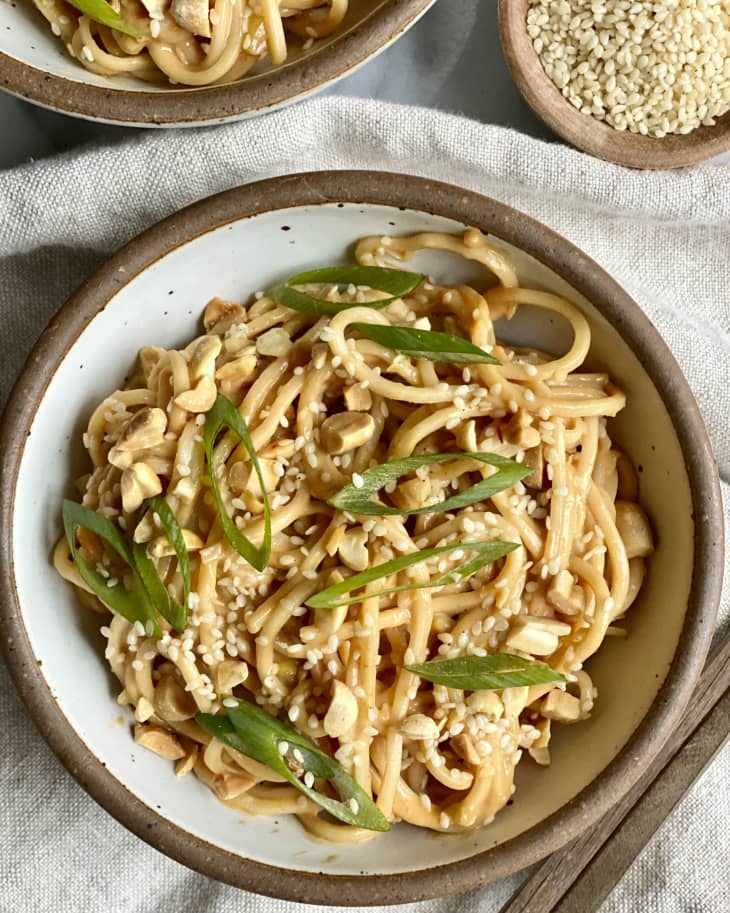Cold Sesame Noodles

The ultimate refreshing cold noodle dish of chewy noodles tossed in a tossed in a sesame-peanut sauce.
Serves2 to 3
Prep12 minutes to 20 minutes
Cook2 minutes to 5 minutes
Cold sesame noodles are a refreshing delight — especially on a hot day or if you want a filling but flavorful on-the-go lunch. There are many versions of sesame noodles, notably ones from Sichuan and Taiwan, but they all contain Chinese sesame paste and other seasonings tossed with chewy noodles. There’s actually very little cooking to do — just boiling the noodles — so prep is relegated to just some chopping and mixing of the sauce. Good Chinese or Taiwanese sesame noodles have a balance of sweet, savory, nutty, and a little bit of heat, so here’s an easy recipe that balances all those flavors into one tasty, slurp-able bowl.
What Are Sesame Noodles Made Of?
Here’s what you’ll need to make sesame noodles.
- Noodles: Thin, dried wheat noodles work best here because they cook up chewy and don’t get too gloppy or gummy when tossed with the sauce. My favorite are Taiwanese noodles called kuan miao. Skip the noodles that contain egg. In a pinch, you can use dried udon noodles instead.
- Peanut butter: While sesame noodles used to contain just or mostly sesame paste, modern versions start with peanut butter. The smooth peanut butter coats the noodles really well and adds a great depth of flavor.
- Chinese sesame paste: Sesame paste is a key ingredient here to round out the sauce, even though you don’t need a lot. Chinese sesame paste is made from darkly roasted sesame seeds, and tastes different than tahini, which is made from unroasted or lightly roasted sesame seeds and has a more bitter flavor.
- Sesame oil: A good spoonful of toasted sesame oil helps thin out the nut butter and adds a delicious toastiness.
- Aromatics: Minced ginger, garlic, and scallions add lots of fresh flavor. Chop the ginger and garlic as finely as you can.
- Sugar: The sweet notes in this recipe come from a spoonful of granulated sugar.
- Soy sauce and rice vinegar: Soy sauce and rice vinegar help thin out the sauce and add savory and acidic notes to balance everything out.
- Garnishes: Sesame seeds, scallion greens, and roasted peanuts add some crunch and color to the finished noodles. You can also toss in matchstick-cut cucumber for some refreshing bites.
Do You Eat Sesame Noodles Hot or Cold?
To make sesame noodles, boil the noodles and then run them under cold water to stop the cooking and to keep them from getting gummy. Toss with the no-cook sauce and they’re ready to eat! These sesame noodles are eaten at room temperature or cold, making them a great make-ahead or on-the-go dish.
What to Serve with Sesame Noodles
Sesame noodles are substantial enough that they can be eaten alone, or you can serve them with some protein like poached chicken or even seared fish. They also go well with a Taiwanese cucumber salad or as part of a hot pot meal.
Sesame Noodles Recipe
The ultimate refreshing cold noodle dish of chewy noodles tossed in a tossed in a sesame-peanut sauce.
Prep time 12 minutes to 20 minutes
Cook time 2 minutes to 5 minutes
Serves 2 to 3
Nutritional Info
Ingredients
- 2 cloves
garlic
- 1 (1-inch) piece
ginger
- 2
medium scallions
- 1/4 cup
smooth peanut butter
- 1 tablespoon
Chinese sesame paste (see Recipe Notes)
- 2 tablespoons
soy sauce
- 2 tablespoons
rice vinegar
- 2 tablespoons
hot water
- 1 tablespoon
granulated sugar
- 1 tablespoon
toasted sesame oil
- 1 teaspoon
Asian chili-garlic paste, such as sambal oelek
- 1/3
medium English cucumber (about 4 ounces, optional)
- 8 ounces
thin dried Chinese wheat noodles, preferably Taiwanese kuan miao
Garnish options:
- 2 tablespoons
roasted salted or unsalted peanuts
- 1 teaspoon
toasted or untoasted sesame seeds
Instructions
Bring a large saucepan of water to a boil over medium-high heat. Meanwhile, make the sauce.
Mince 2 garlic cloves. Peel and mince 1 (1-inch) piece ginger until you have 1 teaspoon. Place both in a large bowl. Thinly slice 2 medium scallions; add the scallion white and light green parts to the bowl and reserve the dark green parts for garnish.
Add 1/4 cup peanut butter, 1 tablespoon Chinese sesame paste, 2 tablespoons soy sauce, 2 tablespoons rice vinegar, 2 tablespoons hot water, 1 tablespoon granulated sugar, 1 tablespoon toasted sesame oil, and 1 teaspoon Asian chili-garlic paste to the bowl and whisk until creamy and combined (it will look curdled at first). Cut 1/3 medium English cucumber into matchsticks (about 1 cup) and add to the bowl of sauce if desired.
Add 8 ounces dried thin Chinese wheat noodles to the boiling water and cook according to package directions until tender. Meanwhile, coarsely chop 2 tablespoons roasted peanuts if desired.
When the noodles are ready, drain and rinse under cold water until cooled. Drain again, shaking off the excess water. Add to the sauce and toss until evenly coated. Garnish with the reserved scallion greens, peanuts, and 1 teaspoon sesame seeds if desired.
Recipe Notes
Noodles: Thin, dried wheat-based Taiwanese noodles (no egg) labeled kuan miao are best for this recipe, but you can substitute dried udon or spaghetti noodles in its place.
Sesame paste substitutions: Tahini can be substituted for the sesame paste, but it has a slightly more bitter taste. More peanut butter can also be used in place of the sesame paste.
Storage: Leftovers can be refrigerated in an airtight container for up to 3 days.
